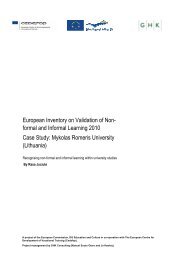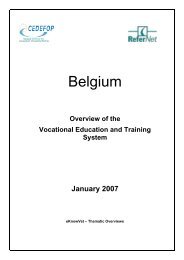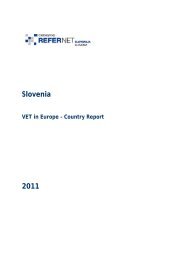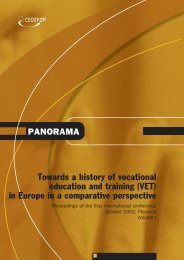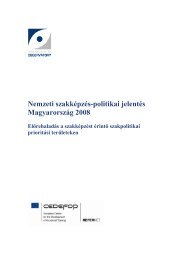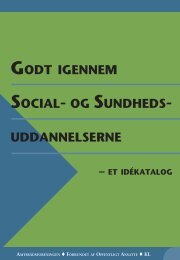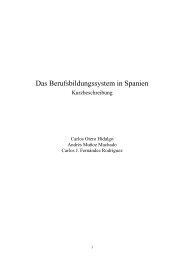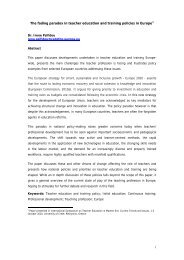PROFF – Professionalisation of VET teachers for the future - Europa
PROFF – Professionalisation of VET teachers for the future - Europa
PROFF – Professionalisation of VET teachers for the future - Europa
You also want an ePaper? Increase the reach of your titles
YUMPU automatically turns print PDFs into web optimized ePapers that Google loves.
• A second important source is <strong>the</strong> European Commission, through <strong>the</strong> European SocialFund (ESF) and (on a smaller scale) through <strong>the</strong> Leonardo da Vinci programme.European funding is important in all Portuguese, several Finnish programmes and in oneDanish case. The preponderant role <strong>of</strong> European finance <strong>for</strong> <strong>the</strong>se programmes is a cause<strong>for</strong> concern. There is a significant risk that, in <strong>the</strong> near <strong>future</strong>, <strong>the</strong> inevitable diversion <strong>of</strong>EU (and particularly ESF) funds to <strong>the</strong> new Member States will lead to financialdifficulties <strong>for</strong> EU-dependent teacher-training programmes.• In Finland and Italy significant funding is provided by local and regional government.• In Denmark, Finland and <strong>the</strong> Ne<strong>the</strong>rlands, vocational training institutions providec<strong>of</strong>unding <strong>for</strong> teacher and trainer training as part <strong>of</strong> <strong>the</strong>ir regular personnel developmentprogrammes.• In Italy, <strong>the</strong> Ne<strong>the</strong>rlands and Portugal <strong>the</strong>re are no tuition fees <strong>for</strong> <strong>teachers</strong> and trainerswho take part in programmes. Some Danish and Finnish programmes, on <strong>the</strong> o<strong>the</strong>r hand,charge tuition fees. In Norway, tuition fees from participants cover <strong>the</strong> whole cost <strong>of</strong>teacher training.• Equality is important in all teacher training programmes. Individual <strong>teachers</strong> participatingin <strong>the</strong>se programmes find <strong>the</strong>mselves in different positions. Some <strong>teachers</strong> can study andupdate <strong>the</strong>ir skills during working hours, but o<strong>the</strong>rs train <strong>of</strong>f-<strong>the</strong>-job. In different casesemployers provide different degrees <strong>of</strong> support, e.g. by paying <strong>for</strong> travel andaccommodation expenses and study materials. As we have seen, some programmesrequire participants to pay tuition fees.3.8. Impact3.8.1. Limitations <strong>of</strong> evaluationIt is not yet possible to evaluate <strong>the</strong> medium- and long-term impact <strong>of</strong> <strong>the</strong> programmesdescribed in <strong>the</strong> case studies. At <strong>the</strong> time <strong>of</strong> writing, many programmes were still in progress.Often <strong>for</strong>mal evaluation <strong>of</strong> outcomes is weak or absent: an un<strong>for</strong>tunate yet common failure.Given <strong>the</strong>se limitations we are <strong>for</strong>ced to base our analysis on three useful <strong>–</strong> but incomplete <strong>–</strong>sources <strong>of</strong> in<strong>for</strong>mation, namely:• material outcomes <strong>of</strong> projects (volumes <strong>of</strong> new learning materials, s<strong>of</strong>tware tools, etc.);• non-material outcomes, reported by programme managers to <strong>PROFF</strong> interviewers (selfevaluation);• feedback from programme participants, collected by programme organisers or by <strong>PROFF</strong>coordinators.31



